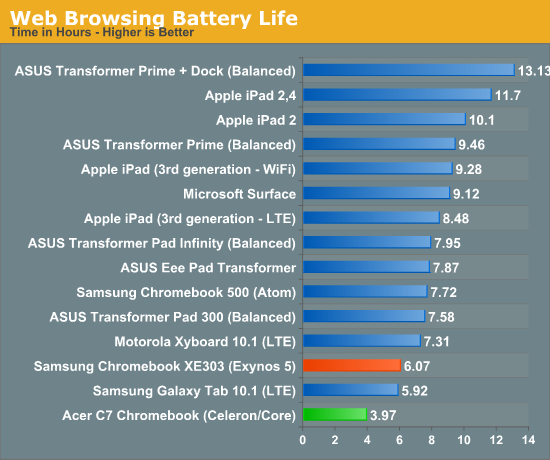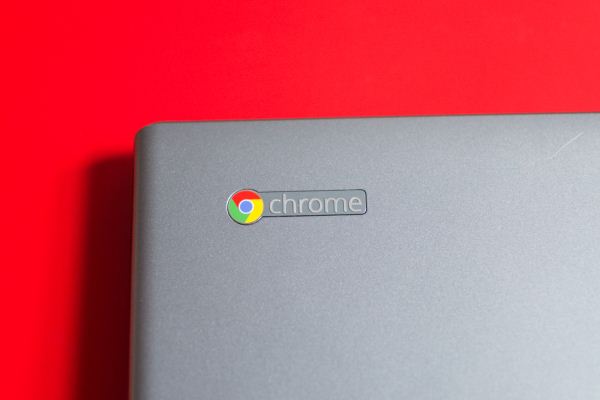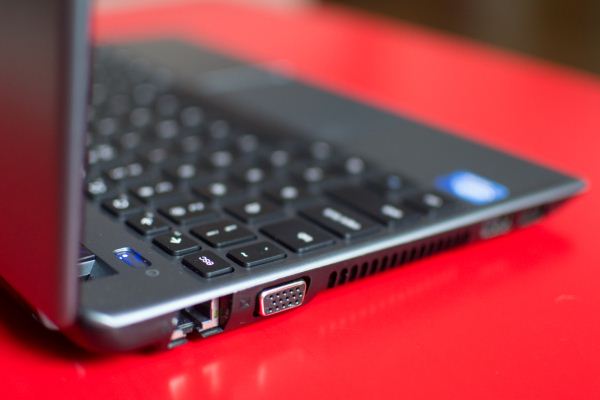Acer C7 Chromebook Review
by Jason Inofuentes on January 21, 2013 12:30 PM ESTBattery Life
If the point of Chrome OS is for you to live in the browser, then the clear choice for testing battery life is our updated Web Browsing battery life test. Here we find that the advertised figure of 4 hours is almost spot on. While it’s nice to see some accuracy in these battery life claims, that’s no salve for the fact that this isn’t a road warrior. This is the lowest common denominator for getting into a Chromebook, but if it can only be untethered for four hours, that doesn’t make this the most mobile device.

Conclusion
I wanted to really dislike this experience, and in many ways it was compromised. But much of that is just a matter of having to live in the browser. Right now, on my MBP I have three browser windows with around two dozen tabs open. I have VLC open for playing some videos while I work, OpenOffice for reading documents that don't get along with Google Docs or TextEdit, Lightroom, Twitter, Scrivener about a dozen TextEdit windows, and Spotify. Now, all of those things can be emulated in a browser window. But local file playback isn't nearly as fulfilling, with any of those solutions, and manipulating large files in the cloud can be a huge hassle. If you can fit your workload inside a browser window, Chrome OS can be great. If you're working with lots of images, lots of larger files, have a penchant for working on a dozen things at a time, then Chrome OS might not stand up to your needs.
So that’s the bad, here’s the good. This thing really does cost just $199. Anand talked about how the $249 price for the ARM-based Samsung Chromebook gave it an almost disposable quality and allowed it to get away with many sins and still be likable for it’s purpose. Here the added power and lower price just emphasize that point. If you need a focused writing device, you certainly couldn’t get more for your money than this. And the hardware you’re paying for isn’t without its merits. The Sandy Bridge cores are good performers, even at 800 MHz, and though the limited RAM and mechanical storage aren’t inspiring, they’re also easily replaceable. As, indeed, is the OS. We’re hoping to explore the possibilities further, but Ubuntu is a real possibility on Chromebooks, as are other Linux builds. So buyers interested in a more full-featured laptop can get their wish with just a few strokes of the keys.
It’s odd to sing a device's praises for what can be done with it, outside it’s intended purpose. We don’t judge a cellphone or tablet based on what wild software and hardware can be hacked upon it. We judge these things based on out of the box performance and features. But then, the PC space has always been for tinkerers. If you can’t fiddle with its innards, something is taken away from the experience. And as the PC space moves further and further down the trail blazed by smartphones and tablets, as users have fewer and fewer opportunities to upgrade their devices, it’s always nice to see a device move the other way.
The Acer C7 Chromebook is the fastest iteration of Chrome OS we’ve seen so far, and is priced so low as to make it the first real impulse buy in the laptop market. Low prices come with compromises, and there are real compromises to all of the Chromebooks. The Samsung Chromebook is nicer to on the eyes and fingers, but slower and pricier. The Acer C7 isn't the total package, but it's pretty good, and definitely worth a shot.












63 Comments
View All Comments
Andrew911tt - Monday, January 21, 2013 - link
The people who read this site would never buy this as a replacement for their main device so there is no need to look at how your daily work flow would not work on this device and make it go cry in the corner.People are looking at this as a second device. I have a great desktop with two monitors and all the bells and whistles if I need to get work done. My second device is a old dell laptop that use in front of the couch or in bed that is the device that this was meant to be/replace.
StormyParis - Monday, January 21, 2013 - link
The people who read this site act as advisers for many people who might want/need such a machine as a primary PC.Andrew911tt - Monday, January 21, 2013 - link
And any person who would consider this as a primary machine don't have that type of work flowphillyry - Monday, January 21, 2013 - link
I'd have to agree with StormyParis.I've actually been considering getting one of these things for my dad as a primary PC simply because he could still check his mail and do his banking while, at the same time, it would be difficult for him to mess it up.
So, let's not make too many assumptions about the readers. We don't all fit your personal usage style or preconceptions.
Andrew911tt - Monday, January 21, 2013 - link
You are making my point the person who ends up with it is going to be using it very sparingly. Your dad is not going to have the work flow that is described in the article, if would be much more facebook and email.JasonInofuentes - Monday, January 21, 2013 - link
So, I think you'd be surprised how many writers see the appeal of the Chromebook. Writing is often a matter of focus. Eliminate distractions and pull together only the resources you need to get the job done. Browser-based publishing tools are polished enough that several of us are actually using them exclusively, including some that even do image manipulations entirely in the browser.So, the Chromebook as a primary device has a lot of appeal.
What I was trying to make clear is how it falters despite having plenty of potential. I have no doubt that as the performance of Chromebooks improves, and as browser-based publishing and media tools become more capable, that I could move to a Chromebook as a primary writing device. I'd still need a better equipped device for a lot of the benchmarking we do, but it'd very much end up being the second device.
jabber - Tuesday, January 22, 2013 - link
I have the Samsung on order to test out and have just bought a Business Google Apps account.I have been talking to a lot of the folks in my small business networking circle and they are really interested in it.
All they need is basic word processing and spreadsheet capability. A group calendar and scheduling. All the documents backed up and centrally stored. Pretty perfect for a lot of small businesses.
That and the cost per user is £2.75 a month! If you have a lot of temp staff passing through you just give them a standard App account and then reset the password when they leave.
That and the lack of virus, not having to buy Office and the low cost of the locked down kit. Support costs are lower.
For a lot of businesses its a no-brainer.
Alexvrb - Monday, January 21, 2013 - link
Correction: Any person who would consider this as a primary machine doesn't have ANY work flow. Flow sure, but work not so much.You said it yourself, people are looking at this as a second device to complement a real computer. But at that point, I think most people would be happier with a tablet as a second device.
silverblue - Tuesday, January 22, 2013 - link
What if you were a author and wanted something cheap and not too small?silverblue - Tuesday, January 22, 2013 - link
'an', rather... I did put writer before, hence the 'a'.